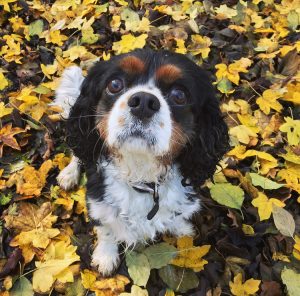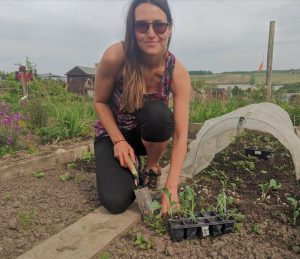
October 16, 2020, by sustainablenottingham
A new job at a strange time
Hi there! I’m Alison and I’m new to the sustainability team here at the University of Nottingham. I will be working to deliver environmental projects and initiatives that will help make sustainable behaviours the norm at the University. More on that in a later blog. For now, here’s a little bit about me.
I started at the beginning of September 2020 and I’d like to give a big shout out to all the other newbies who have begun a new job in a pandemic! It’s an intense enough process at the best of times, let alone during a global crisis – or several in fact.

Eric – cute but largely useless at working from home.
It’s not helped by the fact that when I ask my nearest colleague a simple question, such as how do I raise a purchase order, all I get is a raised eyebrow instead before he rolls over and goes back to sleep. Woof to you too Eric.
Way back when, I was actually a student at the University of Nottingham. With a degree in psychology under my belt, I went on to work in environmental jobs of different sorts, from forest schools to solar panel installations. For the past four year I have worked in science communications and PR, trying to educate and raise awareness about issues including decarbonisation, coastal erosion and brownfield redevelopment.
I’ve always had a passion for wildlife and the great outdoors. My dad was a member of Friends of the Earth and campaigned for them to ban whaling in the 1980s. I followed his lead and started my own campaigns at home, creating posters and sticking them up around the house ordering everyone to turn the lights off, for example, something my older brother didn’t think much of.
Now, hopefully, I have a softer touch when it comes to environmental activism, and rather than preach about what we should all be doing to save the planet, I’d like to offer a few small ideas on how you could reduce your carbon footprint. These are a few of the changes I have made in the last year, some inspired by a lockdown life.
Buy local
Supporting local businesses is now more important than ever, and when it comes to food, knowing where your meat and veg comes from is a must for the ethically conscious. There is already a huge focus on reducing your meat consumption (a must for a sustainable future) but, if you want to keep meat in your diet, be more mindful about where it comes from and the welfare of the animals. Yes, organic will cost you more but it will cost the planet far less, and it’s better for your own health too.

Me – a true multi-tasker: weeding, planting and posing at the same time.
Grow your own
Your veg can’t be any more local than coming from your back garden! This one isn’t new for me as I’ve shared an allotment with a friend for over seven years, but the interest in growing your own has certainly rocketed this year. My advice if you are thinking about an allotment is to share it with someone. It’s a great way of being able to still socialise at a distance, whilst getting some exercise in the fresh air. It makes the whole thing far less daunting and more fun too. There are few things more satisfying than seeing the whole process through from sowing to growing to eating. And it all tastes better than from the supermarket too. You don’t even need an allotment, a couple of pots on a windowsill are enough for a supply of tomatoes, peppers or herbs.
Reduce next day deliveries
It’s all too easy to have whatever you want delivered at the click of a button. However, the faster the delivery the bigger the carbon footprint. Opting for standard, longer delivery times means that companies can plan and fill their vans for the most efficient delivery of goods. Free returns can also equate to having your own personal delivery driver driving back and forth whilst you try out your purchases. Reconsider the need to have everything immediately and move away from fast fashion while you’re at it.
Cutting open toothpaste tubes/facewash/moisturiser
This is an easy one to do but easier to forget. Chop the top off those ‘empty’ squeezy tubes to find weeks’ worth of product still to be used.
The bigger the better
In this instance, I’m talking snacking. Buying bigger, sharing bags of crisps, nuts or biscuits reduces the amount of waste from packaging which is hard to recycle. Provided you can resist the urge to eat the whole bag in one sitting that is.
It’s easy to feel overwhelmed in the face of the might of the ecological crisis. There are just as many questions as answers. All anyone really needs to do is care. Care a bit more, consider our choices, search for the alternatives where we can and generally try to reduce what we buy and ultimately throw away.
I’m looking forward to getting stuck into this role. The university already has sustainability at the heart of its core goals, but when the world is constantly changing, strategies need to evolve too. Keep a look out for future blogs about what the university is working on this year.
If you’d like to get involved, write a blog or tell us your sustainable ideas for the university, please do get in touch with us: sustainability@nottingham.ac.uk.
No comments yet, fill out a comment to be the first

Leave a Reply